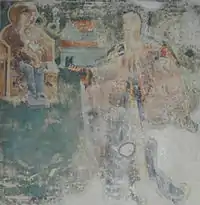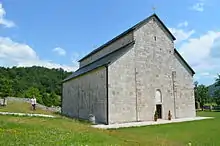Savatije Sokolović
Savatije Sokolović (Serbian Cyrillic: Саватије Соколовић; fl. 1573 – d. 1586), was Archbishop of Peć and Serbian Patriarch from 1585 to 1586. Before that, he served as Metropolitan of Herzegovina from 1573 to 1585. He was a member of the notable Sokolović family, being a nephew of Serbian Patriarch Makarije Sokolović (1557–71). Savatije founded the Piva Monastery in 1573.[1]
Savatije | |
|---|---|
| Archbishop of Peć and Serbian Patriarch | |
 Fresco depicting Savatije with the model of his endowment, the Piva Monastery. | |
| Church | Serbian Patriarchate of Peć |
| See | Patriarchal Monastery of Peć |
| Installed | 1585 |
| Term ended | 1586 |
| Predecessor | Gerasim |
| Successor | Nikanor I |
| Other post(s) | Metropolitan of Herzegovina (1573–1585) |
| Personal details | |
| Born | Savatije Sokolović |
| Died | 1586 |
| Nationality | Rum Millet (Ottoman) |
| Denomination | Eastern Orthodox Christian |
| Parents | Vukašin |
Life
Sokolović was born in Prijepolje,[2] at the time part of the Sanjak of Herzegovina of the Ottoman Empire (now in Serbia). He was a son of Vukašin, the "knyaz of Rudići",[3] and was part of the notable Sokolović family, being a fraternal nephew of Patriarch Makarije (s. 1557–71),[4][5] and relative to many other archbishops, and even Ottoman statesmen.
He succeeded his relative Antonije as the Metropolitan of Herzegovina in 1573, who then became the Serbian Patriarch;[1] the Sokolović bishops were obviously succeeding each other as metropolitan of Herzegovina, then as coadjutor to the Serbian Patriarch, and finally as Serbian Patriarch.[6] That same year, Savatije founded (as ktitor) the Piva Monastery, dedicated to the Dormition of the Most Holy Mother of God,[1][7][8] located by the Piva river[9] in the historical Piva region (the former župa of Piva, in modern-day western Montenegro). The construction workers were brothers named Gavrilo and Vukašin.[3] Russian historian Aleksandr Fedorovich Gilferding (1831–1872) said that the monastery was the greatest and most beautiful building in all of Herzegovina.[10]

He remained the Metropolitan of Herzegovina until his enthronement as the Archbishop of Peć and Serbian Patriarch in 1585,[1] and served until his presumed death in 1586[1] when the last mention is made of him, regarding the finished construction of Piva.[6] He died before Gerasim.[6] Historian S. Novaković (1842–1915) concluded that his death place was in the Ubožac- or Božac Monastery, although this has since been refuted.[11]
Savatije proved himself more energetic than his predecessors, and boldly and persistently, with the help of Grand Vizier Sokollu Mehmed Pasha (Mehmed-paša Sokolović) and other Islamized Sokolović family members, and other Viziers of Serbian origin, to work for the strengthening of Church autonomy.[12] Unfortunately, chronicles have no further information on his life, as is the case with many other Serbian patriarchs.[13] Both Savatije and Sokollu Mehmed Pasha are depicted on the interior frescoes.
References
- Вуковић 1996, p. 435.
- Glas Srpske akademije nauka. Štampa jugoslavskog štamparskog preduzeća. 1949. p. 112.
- Младен Лесковац; Александар Форишковић; Чедомир Попов (2004). Српски биографски речник. Vol. 2. Будућност. p. 570. ISBN 9788683651627.
- Istorija srpskog naroda: knj. Srbi pod tuđinskom vlašđu, 1537-1699 (2 v.). Srpska književna zadruga. 1993. p. 63. ISBN 9788637904762.
- Nićifor Dučić (1894). Istorija Srpske pravoslavne crkve od prvijeh desetina VII v. do naših dana. Drž. stamp Kralj. Srbije. p. 183.
- Владимир Бабић (1960). Историја народа Југославије. Просвета. p. 102.
- Boris Nilević (1990). Srpska pravoslavna crkva u Bosni i Hercegovini do obnove Pećke patrijaršije 1557. godine. Veselin Masleša. ISBN 9788621004270.
- Марица Шупут (1984). Српска архитектура у доба турске власти 1459-1690. Филозофски факултет, Институт за историју уметности. p. 37.
- Александар Дероко (1953). Монументална и декоративна ахитектура у средњевековној Србији. Научна Књига. p. 300.
- Слободан Ристановић (2005). Kroz Srbiju i Crnu Goru. КСЕ-НА. p. 704.
- Geografsko Društvo, Belgrad (1969). Glasnik. Vol. 49–52. p. 66.
- Dušan Baranin (1969). Сабрана дела. Vuk Karadžić. p. 321.
- Glasnik Srbskog učenog društva. Vol. 31. u Državnoj štampariji. 1871. pp. 52–.
Sources
- Ćirković, Sima (2004). The Serbs. Malden: Blackwell Publishing. ISBN 9781405142915.
- Fotić, Aleksandar (2008). "Serbian Orthodox Church". Encyclopedia of the Ottoman Empire. New York: Infobase Publishing. pp. 519–520. ISBN 9781438110257.
- Kašić, Dušan, ed. (1965). Serbian Orthodox Church: Its past and present. Vol. 1. Belgrade: Serbian Orthodox Church.
- Pavlovich, Paul (1989). The History of the Serbian Orthodox Church. Serbian Heritage Books. ISBN 9780969133124.
- Слијепчевић, Ђоко М. (1962). Историја Српске православне цркве (History of the Serbian Orthodox Church). Vol. књ. 1. Минхен: Искра.
- Sotirović, Vladislav B. (2011). "The Serbian Patriarchate of Peć in the Ottoman Empire: The First Phase (1557–94)". Serbian Studies: Journal of the North American Society for Serbian Studies. 25 (2): 143–169. doi:10.1353/ser.2011.0038. S2CID 143629322.
- Вуковић, Сава (1996). Српски јерарси од деветог до двадесетог века (Serbian Hierarchs from the 9th to the 20th Century). Београд: Евро.
